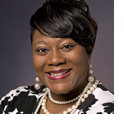
A Note from Ujima Donalson,
POD Director
I hope your holidays were joyous and filled with family and friends, as mine were. For me, that time flew by even faster than usual, and my colleagues and I hit the ground running at the start of the year. Though part of me wishes I'd had a bit more rest and relaxation in the final months of 2014, that's eclipsed by my incredible excitement about everything we've been working on in POD to advance staff training and leadership development at the UW.
At the beginning of the year we debuted a rebrand of the Strategic Leadership Program—the first design overhaul since 2007. The design aligns with the UW's new bold and boundless aesthetic, and we also updated many of the resources referenced in class and in the materials. To date, more than 3,000 UW supervisors have attended SLP, and it's essential that we continue improving and updating this core leadership program. As 2015 progresses, we'll be taking a closer look at program cohesion, case studies, activities, and other content.
My colleague Linda Callecod and I presented at a conference in January on gamification in the adult academic environment, and then at the POD Leadership Preview in early February we talked with UW leaders about our efforts to increase engagement in our classes through gamification. In the meantime, POD has been experiencing some organizational change due to the departure of consultant Amy Hawkins, who moved into a new role within UWHR as director for Childcare Development & Access. I know that many of you have valued working with Amy during her nine years at POD, and in searching for a new team member we are keeping in mind her unique combination of HR knowledge, facilitation skills, and coaching and mediation expertise.
In the midst of the whirlwind that's been the past few months, I've learned something interesting. When we're feeling overloaded, we tend to hunker down so that we can better focus on the obstacles or objectives before us, but it's actually helpful not to keep our heads down too much. As counterintuitive as it may seem, in especially busy times it's important to keep touching people—to keep having exchanges with people in person and to be fully engaged and present at meetings and in conversations.
What I've discovered is that by being present with others while also continuing to communicate about my workload and priorities, people have shown themselves to be incredibly gracious and willing to help. The more I've been upfront about my limited bandwidth, the more others have revealed their capacity and interest, volunteering to take tasks off my hands or doing the heavy lifting on various projects.
As leaders, I think it can be hard to resist the urge to fly solo—particularly when we feel stressed and pressured—but being open with others about our needs may be one of the best things we can do for ourselves and our teams.


